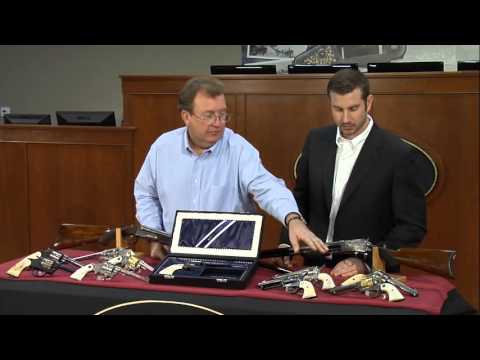All the best firearms history channels streaming to all major devices:
weaponsandwar.tv
Except for the .22 rimfire Glock 44, all the pistols from the Austrian powerhouse Glock have shared the same fundamental mechanical system. They use the Browning tilting-barrel action, which has been long proven by many companies. With the Glock 46, however, they completely changed, and opted for a short recoil, rotating barrel design. The 46 also includes a couple other unique features for Glock, specifically intended to suit its intended role as a German police sidearm.
In Germany, each state is responsible for selecting and procuring police weapons, but they must follow the technical standards set out by the Federal-level government. The standard Glock models do not meet these requirements, and so Glock had to develop a new model if it wanted to compete for police contracts. Most substantially, pistol disassembly must not require pulling the trigger, as this is one of the most common causes of police NDs (and this goes back at least to the Luger, which got its own police safety modification in the 1920s). The gun must also meet minimum requirements for trigger pull weigh, distance, and total force to fire.
To meet these requirements, the Glock 46 has a longer tigger travel than other Glock models, made possible by slightly reshaping the trigger itself. It also has a novel striker disconnect in the back of the slide, which allows (and requires) the striker to be rendered completely inert for disassembly. In addition, a new disassembly lever requires the magazine to be removed before the slide can come off the gun. Put together, these features make the Glock 46 fully compliant with the Federal German police standards.
The rotating barrel system is not required by any other these Federal standards, and it remains a bit unclear why it was chosen. The action itself is distinct from the disassembly safety system, and either one can be incorporated into a design without the other.
Glock has thus far won one German police contract for the 46; that of Saxon-Anhalt. That agency purchased 8,600 Glock 46 pistols for their approximately 6,000 officers. It is extremely unlikely that we will see these pistol in the US, as Glock sells them only to police agencies and not to the civilian market in Europe or the US.
Thanks to Glock for giving me access to film this pistol at their booth at EnForceTac 2024!
Specific German police trigger pull requirements:
First shot:
Minimum pull weight: 30N / 6.7 lbf
Trigger pull distance 10-15mm / 0.4-0.6 in
Minimum value for “trigger work” (Trigger travel x trigger pull weight): 0.15J / 1.3 in-lb
Subsequent shots:
Minimum pull weight: 20N / 4.5 lbf for all following shots
Minimum reset distance: 4mm / 0.16 in
Minimum trigger travel after reset: 7mm / 0.28 in
Requirements for unlocking the action:
In locked systems, the trigger mechanism must be interrupted before the initiation of the unlocking takes place. The path of the moving weapon parts until the trigger mechanism is separated is allowed not be greater than 75% of the safety path.
https://utreon.com/c/forgottenweapons/
http://www.patreon.com/ForgottenWeapons
http://www.floatplane.com/channel/ForgottenWeapons
Cool Forgotten Weapons merch! http://shop.forgottenweapons.com

At Forgotten Weapons I think the most interesting guns out there are the most obscure ones. I try to search out experimental and prototype weapons and show you how they work, in addition to more conventional guns that you may not have heard of before. You’re much more likely to find a video on the Cei Rigotti or Webley-Fosbery here than an AR or Glock. So, do you want to learn about something new today? Then stick around!





